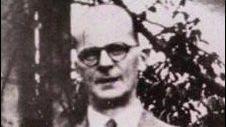
SISTER OF WRONGLY-HANGED MAN DIES DISILLUSIONED
The half-sister of a Welsh van driver wrongly hanged for the infamous 10 Rillington Place murders has died disillusioned by the justice system, her family have said.
Timothy Evans, 25, from Merthyr Vale was sent to the gallows in 1950 in place of an notorious serial killer.
His downstairs neighbour, John Christie, admitted three years later to murdering Tim's wife and baby daughter at his home in Notting Hill, London, where the bodies of eight strangled women were eventually found.
Mary Westlake spent decades campaigning to clear Tim's name, winning a royal pardon for him in 1966, but her brother's conviction was still on the books at the time of her recent death, aged 94.
"It was hard for mum to come to terms with, but I think by the end she’d allowed herself to think about happier things," said her son David Westlake.
He first learned about his uncle Tim around the time when 10 Rillington Place, a book by broadcaster Sir Ludovic Kennedy, was causing a national outcry.
The injustice has featured in at least three books, two films and a folk ballad by Ewan MacColl, as well as parliamentary debates.
Tim was born in Merthyr Vale in 1925 and developed a tubercular verruca at the age of eight that left him in and out of hospital and with little schooling over the next 10 years.
“We were poor, really poor," Mary said in an interview earlier this year.
He was labelled "simple", although he is now known to have been neurodiverse, which Mary said she believes got him into trouble with the police.
"He couldn’t even kid me and mam, so how he thought he could ever bluff detectives is beyond me," she said.
"He wanted to please everyone, telling them exactly what they wanted to hear.”
Tim moved to London in 1946, found work as a van driver, married and had a daughter.
His young family moved into a top-floor flat at 10 Rillington Place where his wife Beryl's strangled body, and that of 13-month-old Geraldine, were later found in an outdoor bath house.
Timothy Evans told the police his neighbour John Christie was to blame, but on 13 January 1950 a jury convicted him of murdering his baby daughter in November of the previous year.
"We never once doubted Tim's innocence, the whole investigation was rotten through," Mary said on the 16th anniversary of her brother's wrongful execution on 9 March 1950.
"They made Tim out to be a simpleton, a drunk and a wife-beater.
"Okay, he couldn't read, because he missed a lot of schooling, but he was bright enough to drive a van all around London, and make deliveries to the right people, even though he couldn't read the signs or a map."
What police missed when they found the bodies of her sister-in-law and niece was the remains of two more victims hidden in the property.
Three years after Tim was hanged, John Christie, 54, admitted murdering his wife Ethel, whose body was found under the floorboards at 10 Rillington Place.
He also confessed to police that he had murdered Beryl and indicated he may have been responsible for Geraldine's death.
The remains of eight strangled women were found at the property, including several prostitutes and the baby.
Christie was hanged in July 1953.
Mary's son David said from the day of Tim's arrest his mother fought to prove his innocence in legal proceedings spanning more than 50 years, as well as campaigning to have the death penalty abolished.
"If the first trial wasn’t enough of a miscarriage of justice," he said, "the appeal was even more of a farce.
"The appellant judge was the father of the prosecuting barrister, so Tim never stood a chance."
His conviction was upheld by an inquiry in 1953, but disquiet about the case only grew with MPs asking questions in parliament and then Kennedy's book, which pressured the government into holding another inquiry in 1965.
It revealed gross malpractice by the police and Tim was granted a free pardon on the recommendation of the home secretary in October 1966.
But Mr Westlake said it also arrived at a perverse conclusion.
"[The Brabin inquiry] found that Tim was probably innocent of killing Geraldine, but had more than likely killed Beryl," he said.
"It was ludicrous. We can say that Tim had got a pardon, but there was still this awful thing hanging over him and the family.”
Mary moved to Wiltshire in the1950s, earning the Queen’s Medal for her service to the armed forces.
But she never forgot about Tim and resumed her legal fight with a grievance to the Criminal Cases Review Commission asking for Tim's conviction to be quashed.
The Home Office agreed to compensate both of Tim's sisters in 2003, but the following year the commission refused to refer his case to the Court of Appeal.
It said the pardon and the publicity of Mr Evans' case as a miscarriage of justice, was "sufficient to establish his innocence and to restore his reputation".
2024-06-23T15:36:29Z dg43tfdfdgfd